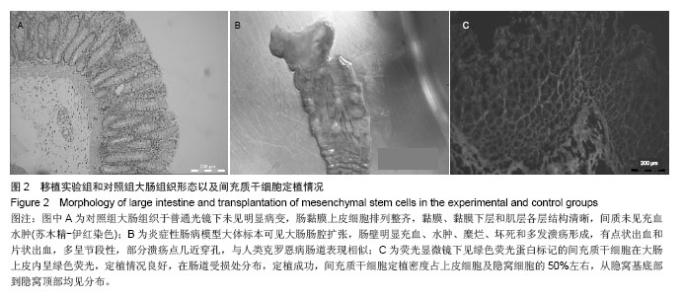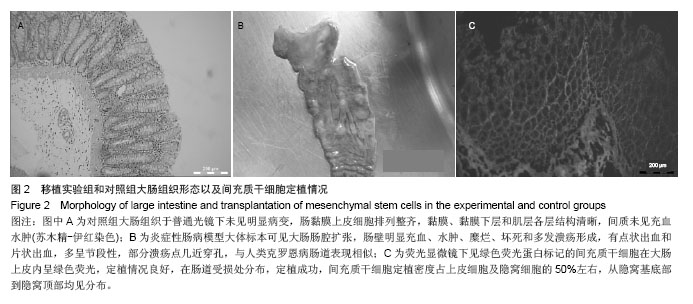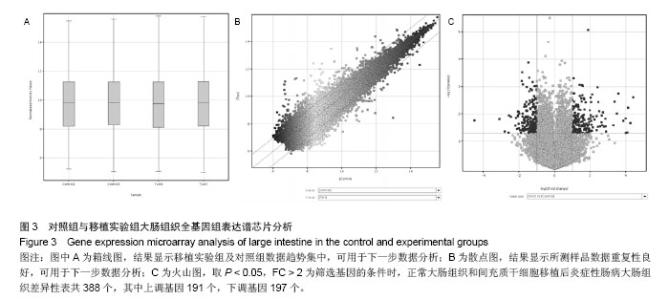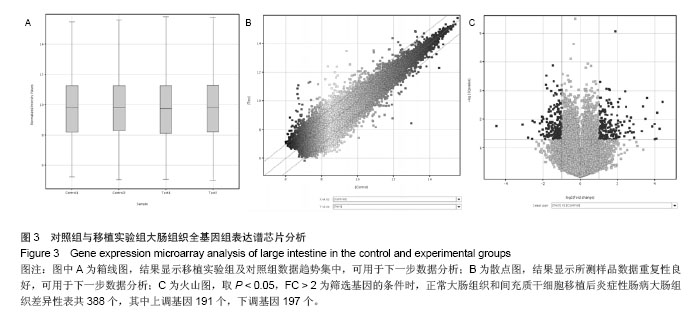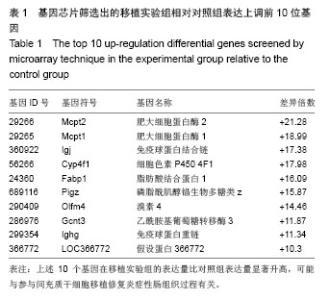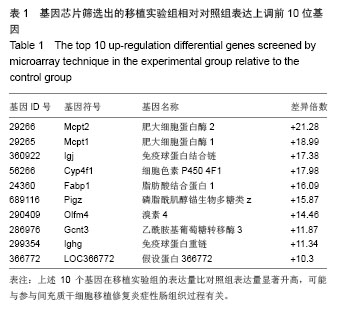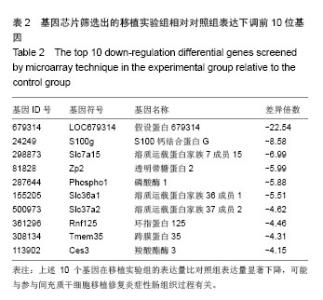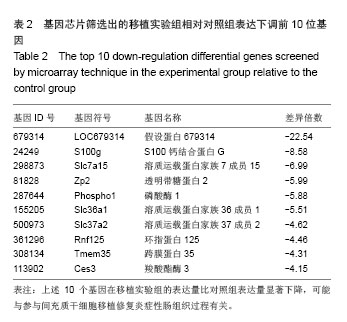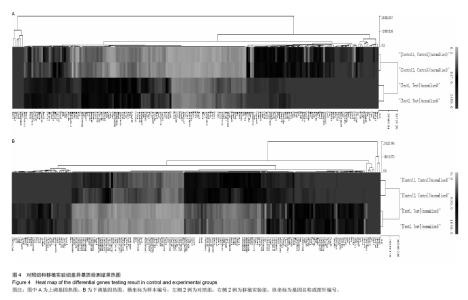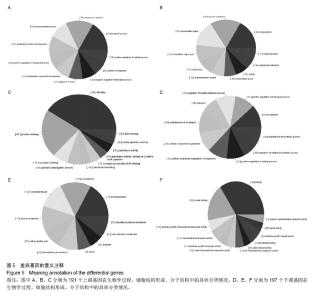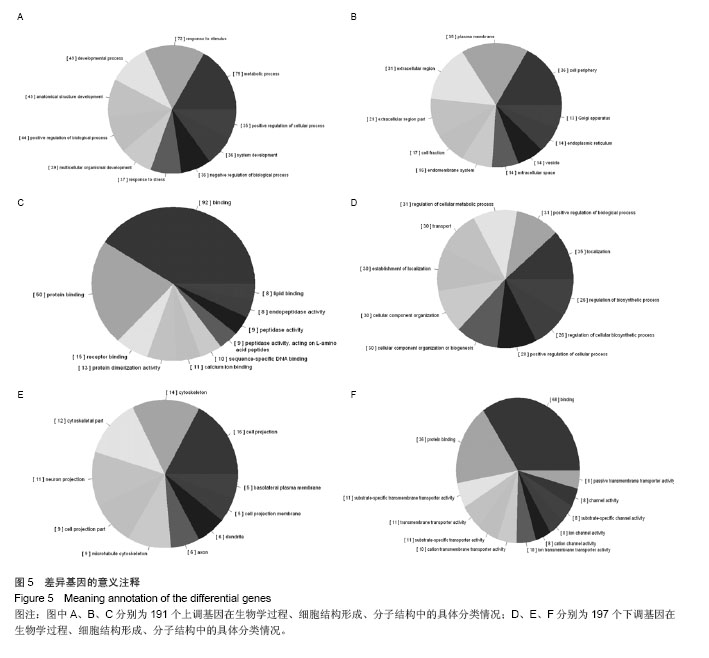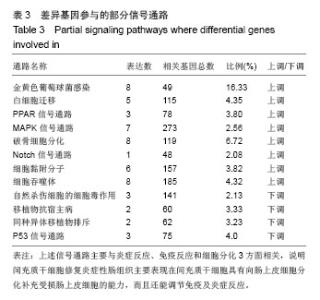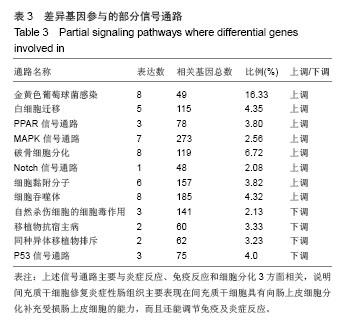Chinese Journal of Tissue Engineering Research ›› 2014, Vol. 18 ›› Issue (28): 4555-4562.doi: 10.3969/j.issn.2095-4344.2014.28.021
Previous Articles Next Articles
Screening main genes during mesenchymal stem cell transplantation in repair of inflammatory bowel tissue
Cao Yan-wen1, Wei Ya-ming2, Li Yu-yuan1, Nie Yu-qiang1, Wu Qian1
- 1 Department of Gastroenterology, Guangzhou First People’s Hospital, Guangzhou Medical University, Guangzhou Municipal Clinical Medical Institute, Guangzhou 510180, Guangdong Province, China; 2 Department of Blood Transfusion, Guangzhou First People’s Hospital, Guangzhou Medical University, Guangzhou 510180, Guangdong Province, China
-
Online:2014-07-02Published:2014-07-02 -
Contact:Wei Ya-ming, M.D., Chief physician, Department of Blood Transfusion, Guangzhou First People’s Hospital, Guangzhou Medical University, Guangzhou 510180, Guangdong Province, China -
About author:Cao Yan-wen, Master, Department of Gastroenterology, Guangzhou First People’s Hospital, Guangzhou Medical University, Guangzhou Municipal Clinical Medical Institute, Guangzhou 510180, Guangdong Province, China -
Supported by:the National Natural Science Foundation of China, No. 81070385; the Scientific Research Project of Returned Overseas Students (Jiaowaisiliu 2012), No. 940; the Major People’s Livelihood Project of Guangzhou City, No. 201300000100
CLC Number:
Cite this article
Cao Yan-wen, Wei Ya-ming, Li Yu-yuan, Nie Yu-qiang, Wu Qian. Screening main genes during mesenchymal stem cell transplantation in repair of inflammatory bowel tissue[J]. Chinese Journal of Tissue Engineering Research, 2014, 18(28): 4555-4562.
share this article
| [1]Yabana T, Arimura Y, Tanaka H,et al.Enhancing epithelial engraftment of rat mesenchymal stem cells restores epithelial barrier integrity.J Pathol. 2009;218(3):350-359.
[2]Pittenger MF, Mackay AM, Beck SC,et al.Multilineage potential of adult human mesenchymal stem cells.Science. 1999;284(5411):143-147.
[3]Friedenstein AJ, Chailakhyan RK, Gerasimov UV.Bone marrow osteogenic stem cells: in vitro cultivation and transplantation in diffusion chambers.Cell Tissue Kinet. 1987; 20(3):263-272.
[4]Halleux C, Sottile V, Gasser JA,et al.Multi-lineage potential of human mesenchymal stem cells following clonal expansion.J Musculoskelet Neuronal Interact. 2001;2(1):71-76.
[5]Muraglia A, Cancedda R, Quarto R.Clonal mesenchymal progenitors from human bone marrow differentiate in vitro according to a hierarchical model.J Cell Sci. 2000;113 ( Pt 7): 1161-1166.
[6]Sarrazin S, Mossadegh-Keller N, Fukao T,et al.MafB restricts M-CSF-dependent myeloid commitment divisions of hematopoietic stem cells.Cell. 2009;138(2):300-313.
[7]Oyama Y, Craig RM, Traynor AE,et al. Autologous hematopoietic stem cell transplantation in patients with refractory Crohn's disease.Gastroenterology. 2005;128(3): 552-563.
[8]García-Olmo D, García-Arranz M, Herreros D,et al. A phase I clinical trial of the treatment of Crohn's fistula by adipose mesenchymal stem cell transplantation.Dis Colon Rectum. 2005;48(7):1416-1423.
[9]Drakos PE, Nagler A, Or R.Case of Crohn's disease in bone marrow transplantation.Am J Hematol. 1993;43(2):157-158.
[10]Kashyap A, Forman SJ.Autologous bone marrow transplantation for non-Hodgkin's lymphoma resulting in long-term remission of coincidental Crohn's disease.Br J Haematol. 1998;103(3):651-652.
[11]Lopez-Cubero SO, Sullivan KM, McDonald GB.Course of Crohn's disease after allogeneic marrow transplantation. Gastroenterology. 1998;114(3):433-440.
[12]Ditschkowski M, Einsele H, Schwerdtfeger R,et al. Improvement of inflammatory bowel disease after allogeneic stem-cell transplantation. Transplantation. 2003;75(10): 1745-1747.
[13]Anumakonda V, Hayee B, Chung-Faye G.Remission and relapse of Crohn's disease following autologous haematopoietic stem cell transplantation for non-Hodgkin's lymphoma.Gut. 2007;56(9):1325.
[14]赖洁莹,李瑜元,魏亚明,等.骨髓造血细胞移植治疗克罗恩病的动物研究[J].广州医学院学报,2006,34(6):1-4.
[15]Wei Y, Nie Y, Lai J,et al.Comparison of the population capacity of hematopoietic and mesenchymal stem cells in experimental colitis rat model.Transplantation. 2009;88(1):42-48.
[16]魏亚明,聂玉强,李瑜元,等.炎症性肠病及其干细胞移植再生修复[J].世界华人消化杂志,2006,14(13):1314-1317.
[17]李瑜元,聂玉强,赖洁莹,等.干细胞移植对大鼠实验性结肠炎的研究[J].中华消化杂志,2008,28(6):364-368.
[18]Hollenbach E, Vieth M, Roessner A,et al.Inhibition of RICK/nuclear factor-kappaB and p38 signaling attenuates the inflammatory response in a murine model of Crohn disease.J Biol Chem. 2005;280(15):14981-14988.
[19]Golub TR, Slonim DK, Tamayo P,et al.Molecular classification of cancer: class discovery and class prediction by gene expression monitoring.Science. 1999;286(5439):531-537.
[20]Snijders AM, Meijer GA, Brakenhoff RH,et al.Microarray techniques in pathology: tool or toy.Mol Pathol. 2000;53(6): 289-294.
[21]He XW, He XS, Lian L,et al.Systemic infusion of bone marrow-derived mesenchymal stem cells for treatment of experimental colitis in mice.Dig Dis Sci. 2012;57(12): 3136-3144.
[22]陈隆典,欧阳建,张晓琦,等.自体造血干细胞移植治疗难治性炎症性肠病10例回顾与随访[J].中华消化杂志,2008,28(7):476-479.
[23]Yamamoto T, Fujiwara K, Yoshida M,et al.Therapeutic effect of kakkonto in a mouse model of food allergy with gastrointestinal symptoms.Int Arch Allergy Immunol. 2009; 148(3):175-185.
[24]Schouten B, van Esch BC, Hofman GA,et al.Acute allergic skin reactions and intestinal contractility changes in mice orally sensitized against casein or whey.Int Arch Allergy Immunol. 2008;147(2):125-134.
[25]Te Velde AA, Pronk I, de Kort F,et al.Glutathione peroxidase 2 and aquaporin 8 as new markers for colonic inflammation in experimental colitis and inflammatory bowel diseases: an important role for H2O2. Eur J Gastroenterol Hepatol. 2008; 20(6):555-560.
[26]Pemberton AD, Brown JK, Wright SH,et al.The proteome of mouse mucosal mast cell homologues: the role of transforming growth factor beta1.Proteomics. 2006;6(2):623-631.
[27]Gallwitz M, Hellman L.Rapid lineage-specific diversification of the mast cell chymase locus during mammalian evolution.Immunogenetics. 2006;58(8):641-654.
[28]Gallwitz M, Enoksson M, Hellman L.Expression profile of novel members of the rat mast cell protease (rMCP)-2 and (rMCP)-8 families, and functional analyses of mouse mast cell protease (mMCP)-8.Immunogenetics. 2007;59(5):391-405.
[29]Takemoto S, Yamamoto A, Tomonaga S,et al.Magnesium deficiency induces the emergence of mast cells in the liver of rats.J Nutr Sci Vitaminol (Tokyo). 2013;59(6):560-563.
[30]Rinaldi M, Dreesen L, Hoorens PR,et al.Infection with the gastrointestinal nematode Ostertagia ostertagi in cattle affects mucus biosynthesis in the abomasum.Vet Res. 2011;42:61.
[31]Oshiumi H, Matsumoto M, Seya T.Ubiquitin-mediated modulation of the cytoplasmic viral RNA sensor RIG-I.J Biochem. 2012;151(1):5-11.
[32]Asahina Y, Izumi N, Hirayama I,et al.Potential relevance of cytoplasmic viral sensors and related regulators involving innate immunity in antiviral response.Gastroenterology. 2008; 134(5):1396-1405.
[33]Kawasaki H, Yoshida T, Horiguchi K,et al.Characterization of anoikis-resistant cells in mouse colonic epithelium.J Vet Med Sci. 2013;75(9):1173-1180.
[34]Ziskin JL, Dunlap D, Yaylaoglu M,et al. In situ validation of an intestinal stem cell signature in colorectal cancer.Gut. 2013;62(7):1012-1023.
[35]Gersemann M, Becker S, Nuding S,et al.Olfactomedin-4 is a glycoprotein secreted into mucus in active IBD.J Crohns Colitis. 2012;6(4):425-434.
[36]Yu L, Wang L, Chen S.Olfactomedin 4, a novel marker for the differentiation and progression of gastrointestinal cancers. Neoplasma. 2011;58(1):9-13.
[37]Zhang J, Liu WL, Tang DC,et al.Identification and characterization of a novel member of olfactomedin-related protein family, hGC-1, expressed during myeloid lineage development.Gene. 2002;283(1-2):83-93.
[38]VanDussen KL, Carulli AJ, Keeley TM,et al. Notch signaling modulates proliferation and differentiation of intestinal crypt base columnar stem cells.Development. 2012;139(3):488- 497.
[39]Dooley TP, Curto EV, Reddy SP, et al.Regulation of gene expression in inflammatory bowel disease and correlation with IBD drugs: screening by DNA microarrays.Inflamm Bowel Dis. 2004;10(1):1-14.
[40]常晓彤,王振辉,付小兵.内源性肝脂肪酸结合蛋白基因与肠道干细胞分化发育的关系[J].中国临床康复,2003,7(14):2022-2023.
[41]Goretsky T, Dirisina R, Sinh P,et al.p53 mediates TNF-induced epithelial cell apoptosis in IBD.Am J Pathol. 2012;181(4):1306-1315.
[42]Lo Furno D, Graziano AC, Caggia S,et al.Decrease of apoptosis markers during adipogenic differentiation of mesenchymal stem cells from human adipose tissue. Apoptosis. 2013;18(5):578-588.
[43]Mei Y, Bian C, Li J,et al.miR-21 modulates the ERK-MAPK signaling pathway by regulating SPRY2 expression during human mesenchymal stem cell differentiation.J Cell Biochem. 2013;114(6):1374-1384.
[44]Monaco E, Bionaz M, Rodriguez-Zas S, et al.Transcriptomics comparison between porcine adipose and bone marrow mesenchymal stem cells during in vitro osteogenic and adipogenic differentiation.PLoS One. 2012;7(3):e32481. |
| [1] | Wang Yifei, Song Yang, Guan Yongge, Xu Chunyan. Bone marrow mesenchymal stem cell transplantation in a rat model of thin endometrium based on HOXA10 regulatory network [J]. Chinese Journal of Tissue Engineering Research, 2019, 23(9): 1397-1402. |
| [2] | Zhang Deguo, Tan Xueying, Tang Nan, Huang Fei, Shi Guangjun. Human adipose-derived mesenchymal stem cell transplantation via the tail vein for acute liver failure in rats [J]. Chinese Journal of Tissue Engineering Research, 2019, 23(9): 1416-1421. |
| [3] | Liu Meilin, Fu Songtao, Wang Peisen, Hao Ran, Chang Bingmei, Hou Xiuying. Liposome prepared from human umbilical cord mesenchymal stem cell conditioned medium for repair of skin wound in rats [J]. Chinese Journal of Tissue Engineering Research, 2019, 23(5): 734-740. |
| [4] | Feng Fang, Dong Chenming, Chen Yu, Qi Yan. Adipose tissue-derived mesenchymal stem cell transplantation for treating septic rats with acute respiratory distress syndrome and the underlying mechanism [J]. Chinese Journal of Tissue Engineering Research, 2019, 23(5): 741-748. |
| [5] | Zhang Pin, Guo Ying, Gao Yajie, Wang Zhendong, Li Baiyi, Zhang Xiaomin, Niu Yuhu, Liu Zhizhen, Ma Lihui, Niu Bo, Guo Rui. Exosomes derived from human umbilical cord mesenchymal stem cells promote myocardial repair after myocardial infarction under hypoxia [J]. Chinese Journal of Tissue Engineering Research, 2019, 23(17): 2630-2636. |
| [6] | Guo Bo, Liu Jia, Cui Xiaolan, Shi Han, Zhang Sheyi, Wang Jia, Shan Xia, Wang Yizhong. Human umbilical cord mesenchymal stem cells combined with immunotherapy for the treatment of type 1 diabetic mice [J]. Chinese Journal of Tissue Engineering Research, 2019, 23(13): 2016-2021. |
| [7] | Liu Jian, Li Li, Wang Xiaochuan, Zhang Shengning, Li Laibang, Mang Yuanyi, Gao Yang, Chen Yonglin, Ren Gang, Li Wang. Mild hypothermia combined with adipose-derived mesenchymal stem cells protects hepatic function in hepatic ischemia-reperfusion injury [J]. Chinese Journal of Tissue Engineering Research, 2019, 23(13): 2081-2087. |
| [8] | Zhang Yunke, Che Zhiying, Li Ke. Effect of Buyang Huanwu Decoction combined with bone marrow mesenchymal stem cell transplantation on expression of tight junction proteins in the brain of cerebral ischemia-reperfusion rats [J]. Chinese Journal of Tissue Engineering Research, 2019, 23(1): 55-60. |
| [9] | Ren Hao, Dong Jing, Liu Li-wei, Chen Zhao-lin, Pan Jin-jin, Chen Xi, Song Hai-yan, Zhang Jun-fei, Chen Cong-xin, Liu Bo. Risk factors for hepatocellular carcinoma in hepatitis B cirrhosis patients given treatment with human umbilical cord mesenchymal stem cell [J]. Chinese Journal of Tissue Engineering Research, 2018, 22(9): 1350-1356. |
| [10] | Hu Ji-hong, Zhao Jing-miao, Wang Qiu-ping, Jia Jia, Lu Juan, Jin Hua, Hou Qian. Effects of bone marrow mesenchymal stem cell transplantation on voltage-gated K+ channel proteins and cytokines in the infarcted myocardium of rats [J]. Chinese Journal of Tissue Engineering Research, 2018, 22(9): 1389-1394. |
| [11] | Gao Ming-long, Shi Shao-xia, Zhang Kun, Zhang Ying-dong, Li Na, Yu Ming, Wang Yong-liang. Effects of brain-derived neurotrophic factor-modified human amniotic membrane-derived mesenchymal stem cell transplantation on learning and memory abilities of Alzheimer's disease rats [J]. Chinese Journal of Tissue Engineering Research, 2018, 22(9): 1419-1424. |
| [12] | Shang Qing-qing, Zhou Jian-ye, Li Kai, Sun Jia-kang, Meng Jian, Li Jun. Combination of hyaluronic acid and bone marrow mesenchymal stem cells promotes cardiac function after myocardial infarction [J]. Chinese Journal of Tissue Engineering Research, 2018, 22(5): 675-679. |
| [13] | Sun Jing-song, Zhou Xue-ying, Qu Shu-xian, Bu Tong-jing, Li Shuang-yue. Bone marrow mesenchymal stem cell transplantation inhibits apoptosis in the rat spinal cord injured by acrylamide [J]. Chinese Journal of Tissue Engineering Research, 2018, 22(5): 680-685. |
| [14] | Liu Ke-na, Li Dong, Yang Guang-sheng. 3D-cultured umbilical cord mesenchymal stem cells for treatment of type 1 diabetes: therapeutic effects and immunomodulatory mechanism [J]. Chinese Journal of Tissue Engineering Research, 2018, 22(5): 692-697. |
| [15] | Xu Fan, Lei Ming, Long Long, Gong Qi-hai, Gao Jian-mei. Mesenchymal stem cell transplantation improves the prognosis of ischemic stroke: a Meta-analysis [J]. Chinese Journal of Tissue Engineering Research, 2018, 22(5): 760-765. |
| Viewed | ||||||
|
Full text |
|
|||||
|
Abstract |
|
|||||
